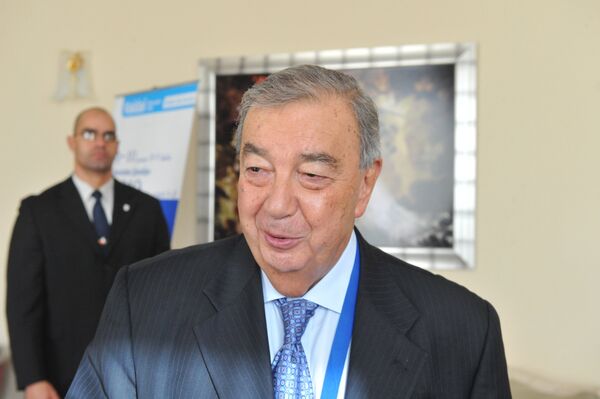MOSCOW, September 24 (RIA Novosti) - The Islamic State's growing body of recruits and its rapid progress across Syria and Iraq pose a serious threat to the global community and require all nations in the UN Security Council to join their forces in fighting back against the IS insurgency, a former Russian prime minister and foreign intelligence service chief said Wednesday.
"A victorious IS has become a magnet for hosts of extremist Islamist organizations. This group is gradually turning into a global hub for zealous Islamic radicalism," Yevgeny Primakov, a former Russian prime minister and a renowned Middle East expert who also served as Russia's foreign intelligence service chief, was cited by the country's Rossiyskaya Gazeta as saying.
In an article published Wednesday, Primakov listed several factors that made this particular militant group a significant threat to global security.
The IS offensive is gaining steam in the Middle East, bringing more and more militant groups into its fold in a bid to create an Islamic caliphate in the lands of Iraq and Greater Syria. It has managed to assemble under its banners the most radical and zealous extremists first in Syria, where it rallied Sunni rebels fighting against the Alawite government of Bashar Assad, and then in Iraq rounding up former loyalists of Saddam's Baath party.
The IS progress in spreading across Syria and northern Iraq rekindled hope in the hearts of jihadists in other Middle Eastern countries, as well as in Northern Africa, Europe, America and Australia. Its leading role in the Islamist uprising in Syria has been recognized by the Free Syrian Army and the local al-Qaeda spinoff called al-Nusra Front.
According to CIA reports, the IS has tripled in force over the spin of the last three months. During the same period, the Islamic State rose from a fledgling movement to a dominant insurgency in the region controlling Iraq's second-largest city of Mosul and a swath of territories west of it.
To make matters worse, the seizure of Mosul has made IS economically independent from its murky donors, Primakov said. The organization has been smuggling crude pumped from some 80 IS-held oil wells and selling it to unscrupulous buyers in Turkey, Jordan, Syria and other traders who have no fear of Washington.
According to the former prime minister, ideologically, Islamic State's agenda of creating a caliphate for all Muslims under its dominance seems very appealing to local rebel groups, despite a group of five allied Arab states officially opposing this plan.
The rapid spread of insurgency throughout the Arab world in September prompted the United States Washington to establish a multinational coalition, after authorizing in August airstrikes on IS fighters on Iraqi territory.
This was followed by air campaigns on the Syrian soil, which were not agreed with the Assad administration leading to fears of US airstrikes being used as a smoke screen for an offensive targeting the Damascus-based government in the country without UN's authorization.
"The situation is quite serious, and it undoubtedly requires multinational cooperation, first of all from UN Security Council's permanent member states, in confronting the IS group. The war on international terrorism must not be impeded by any disputes, including that on the "Ukrainian issue," Primakov concluded.
The Russian Foreign Ministry warned Washington earlier that those initiating "one-sided brute-force scenarios" were also legally liable for the consequences of their decisions. It stressed that Damascus' go-ahead was crucial in defining the lawfulness of US airstrikes on the Syrian territory where Washington has long been vocally supportive of what it calls "moderate" rebel fighters.


